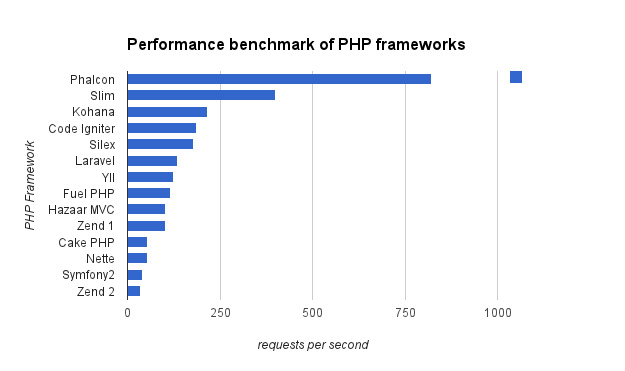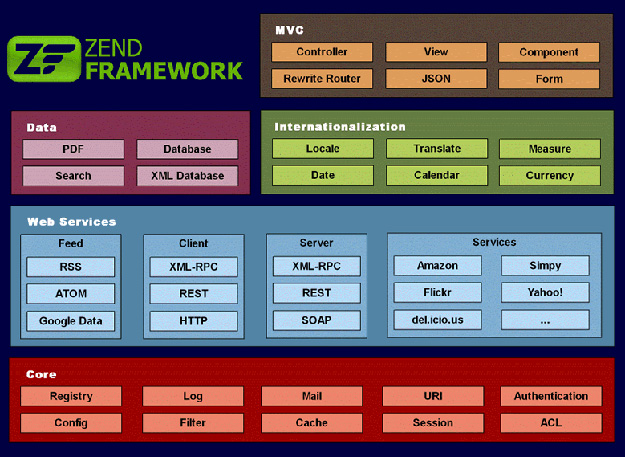PHP Frameworks – Laravell V’s Zend
In computer programming, frameworks are software based abstractions that supply functionality for developers to add user-written code if required and provide application specific software. However there are different types of frameworks that are analogous with various coding languages. PHP, originally an acronym for Personal Homepage that evolved to Hypertext Preprocessor, is a coding language that has many different frameworks – including Laravel and Zend. Their different features set them apart for the types of projects they serve, due to the alternative structures they provide. The comparison table further down, highlights the differences between these two frameworks and any other elements not mentioned are commonalities.

Picture: systemsarchitect.net
LARAVEL has syntax that is free form, can be tailored for your team and is therefore beautifully expressive for programmers that have artisan tendencies. It’s an effective way to load a PHP library and affords flexibility within experimental or bespoke projects.
ZEND is secure, adaptable, high performance, has a communal user base, is successful in high usage applications and is modular. Additionally, it has API’s (application program interface) and assists developers in coding faster.

Picture: linux.softpedia.com
COMPARISON TABLE
Feature |
Laravel |
Zend |
|---|---|---|
| License | Mit License | Bsd License |
| Memory Recommended | 1 Gb | 512 Mb |
| Database Model | Relational | Object Orientated |
| Trackback | Conditional | Operational |
| Template Language | Accounts for Blade in Addition to Php, Smarty and Twig, | Does not account for Blade in addition to Php, Smarty and Twig |
| Target Audience | Web Development | Enterprise |
| Development Principles | Test-driven development, No repetition, Configuration over convention | Configuration over convention |
| Difficulty Level | Ranges from Beginner to Advanced | Advanced Master |
| Released Version | 5.0 | 2.0 |
| Programming Paradigm | Functional, Event Driven, Object Orientated | Event Driven, Object Orientated |
| Scripting Language Support | Php & Amp; Javascript | Php |
| Front End | Php | Php & Javascript |
| Creation Date | 2011 | January 2006 |
| Reliability | 5 Star | 4 Star |
| Conditional Compiled Language | No | Yes |
| Client/Server Code Reuse | Model View Controller, Template Language, Web Services | Model View Controller |
| Data Storage | Berkeley Db, Relational Db, File System | Relational Db, File System |
| Library File Size | 17Mb | 8Mb |
| Api Comprehensibility | 5 Star | 3 Star |
| Implementation Flexibility | 55% | 45% |
| Out of the Box Functionality | 46% | 54% |
| Realtime | No | Yes |
| Community Feedback | 5 Star | 4 Star |
| Ease of Use | 5 Star | 3 Star |
| Uncompressed Size | 2Mb | 9Mb |
| Maven Support | No | Yes |
| Resource File Processing | Yes | No |
| Partial Classes | Yes | No |
| Javascript Library included | No | Yes |
| Click and Edit in Place / Wysiwyg | Yes | No |
| Requests Per Second | 100 | 1000 |
| Modules/Extensions/Plug-Ins | 8000 | 9999 |
| Developers | 205 | 0 |
| Easy to Configure | Yes | No |
| Supported by Microsoft | No | Yes |
| Xss | Yes | No |
| Inbuilt Captcha | No | Yes |
| Cloud Platform Support | Google App Engine, Amazon Ec2, Fortrabbit, Pagoda Box, Digital Ocean, Heroku, Linode, Openshift | Windows Azure, Amazon Ec2, Heroku, Openshift |
| Email Protocol | Smtp, Imap, Pop3, Mailgun, Mandrill | Imap, Pop3, Smtp |
| Design Pattern | Active-Record, Model-View-Controller, Dependency Injection, Observer, Singleton, Facade, Event-Driven, Mtv | Dependency Injection, Model-View-Controller, Event-Driven, Data Mapper, Singleton, Active-Record |
| Database | Sqlite, Mysql, Postgresql, Redis, Microsoft Bi | Microsoft Bi, Mysql, Postgresql, Mariadb, Sqlite, Ibm Db2, Oracle, Mongodb |

Picture: Beebom
Laravel provides developers with free expression enabling them to define their own paths by writing code that is less rigid than Zend – a framework that although adheres to a standardisation of structure, offers more security. The developer is responsible for defining the structure and document process, to create a structure unless it’s already predefined. Laravel is useful for a fun small scale project unless coding rules for artistic freedom are clarified for other developers working on larger sites. Zend provides efficiency for large scale projects as the template is more compliant with ease of use and has a more reliable infrastructure. However, overall Laravel seems to be surpassing Zend in pliancy and as such, provides developers with more coding options.